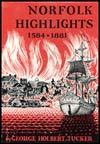Chapter 12
A Colorful Pre-Revolutionary Mayor
It took a cool head and plenty of self-confidence to charge into a mob of brawling sailors and come out unscathed. Fortunately, Maximilian Calvert (1722-1782), Norfolk's most colorful pre-Revolutionary mayor, had both qualities in abundance. This is how his daughter, Mrs. Helen Calvert Maxwell Read, tells the anecdote in her memoirs:
"My father was for many years an alderman of the Borough Court and sometime Mayor of Norfolk. One night, it seems, there was a great riot in Portsmouth, from the sailors of a Spanish ship who had broken loose and taken the streets and were carrying all before them. The trustees and citizens came out to stop them, but without effect, when they bethought themselves to send over to the Mayor of Norfolk for help. My father, of course, repaired with all dispatch to the scene, dressed out in his best coat with his long cane, and a posse of gentlemen and constables in his train, and rushing into the midst of the mob, commanded them all to disperse in the name of the Commonwealth. This, however, though somewhat awed by his voice (which he had been used to raise in a gale of wind), they were rather unwilling to do, (and) demanded who he was that they should obey him. To which, aware of the respect which they all attached to long names, he dexterously replied, assuming his most dignified air, 'I am Don Maximilian Calverto, Grand Magistrate de Norfolco Boro' -- upon which, not doubting he was a grandee of the first rank, they all took off their hats to him and returned very peacefully to their ship. This exploit, of course, got him great fame in those days."
Calvert, mayor of Norfolk in 1765 and 1769, was a picturesque character. He was the second of thirteen children of Cornelius Calvert, the founder of a well-known old Norfolk family, and Mary Saunders Calvert, the daughter of an Anglican clergyman. He went to sea at an early age, and by the time he was in his late teens he was captain of a vessel sailing between Norfolk and the West Indies, all of which made his daughter recall another good story concerning him.
"He had been ashore one day while his ship was lying in the harbor of Bridgetown to dine with a gentlman of that place, and returning on board rather late in the evening after having dined and drunk pretty freely, of course, as the fashion was, he found that the mate had turned in and fastened the cabin door, and unwilling to wake him up he threw himself on the deck and slept the whole night.
But the next morning he found that his knee was stiff, from the effect of the night air, and all the doctors whom he consulted were unable to restore it again. This defect, however, did not diminish but somewhat increased the stateliness of his gait, by making him carry himself still more erect, and his walk and carriage were imposing. He used to dress well, and wore the fine old-fashioned coat with large cuffs and ruffles at the hand. He was of gay and sociable disposition, fond of talking and joking, and lived on the best terms with his friends and neighbors."
Mayor Calvert also liked high living and this is how his daughter recalled his eating and drinking habits for posterity.
"My father was fond of good living, and kept a famous cook -- poor old Quashabee, the ugliest creature my eyes ever beheld, but a capital cook, and made the best soups, sauces, gravies, and all such things, in the world. He was also fond of good drinking, though he never drank to excess. He was particularly fond of arrack punch (which, however, he drank weak), and always kept his silver tankard by him holding three pints, which he would empty two or three times a day, till the doctors began to be afraid he would fall into a lethargy, of which he showed some symptoms, and limited him to one."
Chapter
13
Paul Loyall and the Press Gang
Norfolk Highlights 1584 - 1881

See the "Table of Contents" for links to every chapter in Norfolk Highlights 1584 - 1881 by George Holbert Tucker.
